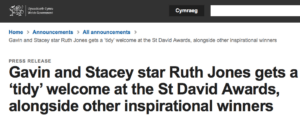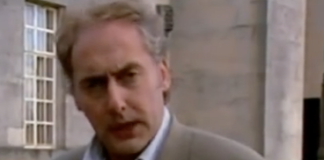- Opposites attract - 26th February 2026
- Upset coffee - 25th February 2026
- Not acting the part - 24th February 2026

During 23 years with the BBC, and 41 years in journalism (when he was trained to use simple language, avoiding jargon), for our Editor, Welshman Phil Parry, the correct use of words was always paramount, and now this is underlined by the UK and Welsh governments employing ‘tabloidese’ from 40 or 50 years ago to make announcements seem exciting, when the language is actually from a time gone by!
To a younger person especially these words must be bewildering.

The Treasury recently referred to Chief Executive Officers (CEOs) of manufacturing companies as “captains of industry”, a term with a whiff of the 1970s.
Few of Sir Keir Starmer’s Millennial voters will know how to “kickstart” something, since motorbikes now use more reliable electric starter motors.
Despite this in recent weeks the UK Government has promised to do just this to, among other things, the Liverpool-Hull corridor, the carbon-capture industry, a defence agreement with Norway and social-care reform.

Even fewer will know that a ‘turbocharger’ makes a car go faster by compressing exhaust gases with fuel, but Sir Keir wishes to do this to housebuilding, defence innovation, infrastructure investment and financial services.
Circulation figures for tabloid newspapers are down, but the strange form of the English language the tabloids still use, also lives on in Whitehall.
To read a media notice from a government department is to encounter the vocabulary of Fleet Street from the past; there are “bumper packages”, “boosts” and ministers “banging the drum for Britain”.
This quaint world is inhabited by “hardworking Brits”, who want “bobbies on the beat” to arrest the perpetrators of “vile crimes”.


The Welsh Government (WG) isn’t immune either.
Their information departments use old-fashioned tabloid clichés freely.
A recent announcement was: “The vandalism hotspot in Prestatyn has been transformed into a first-class space for employment use by James Industrial Limited”.
But does it really have to be a ‘hotspot’, can’t it just be an ‘area’?
 Lame 1950s style humour seems to abound in the announcements, conjuring up images of men in bow ties making mother-in-law jokes.
Lame 1950s style humour seems to abound in the announcements, conjuring up images of men in bow ties making mother-in-law jokes.
An example recently was: “The co-writer (Ruth Jones of Gavin and Stacey) wondered ‘what’s occurring’ when she was celebrated for her massive success in capturing the heart of the nation and putting an international spotlight on Wales…”. The headline above it was that she had received a ‘tidy’ welcome.

Boom, Boom! I’m here all week!
Schemes are often dressed up as important using old-fashioned words when the reality is rather different.
Let’s look at this one for instance about money for public transport in Wales: “(A) major investment from the Welsh Government will help people get around more easily and help make better transport accessible for everyone”, adding: “£110 million has been announced for local authorities to improve local transport across Wales”.
But, frankly, this isn’t ‘major’ at all, because it’s spread across the entire country.
Perhaps I should get a job in the government media office so that these tired phrases aren’t used any more.

That would be a ‘major boost’, but the thought is ‘vile’…
The memories of Phil’s astonishing, decades long award-winning career in journalism (when the correct use of words was central) as he was gripped by the rare neurological disabling condition Hereditary Spastic Paraplegia (HSP), have been released in the book ‘A Good Story’. Order it now.
Tomorrow – why disturbing news of how a former UK cabinet minister has demanded a police investigation, and that 400 healthcare workers are now calling for a review of the convictions of Lucy Letby, highlights the central role of Wales in the extraordinary case.








